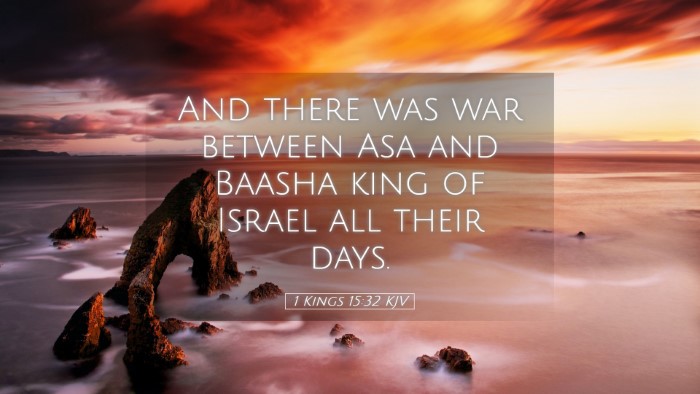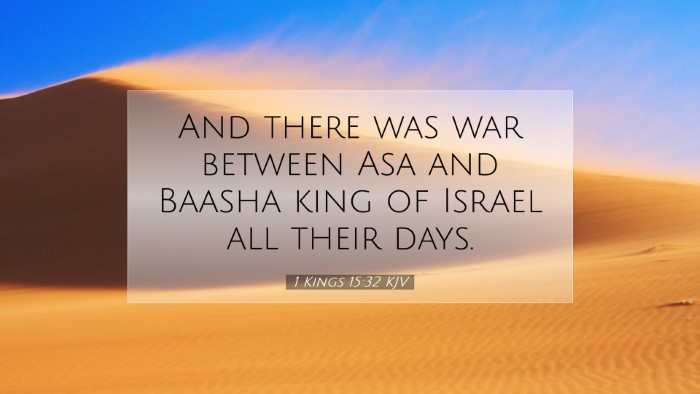Commentary on 1 Kings 15:32
Verse Context: 1 Kings 15:32 states: "And there was war between Asa and Baasha king of Israel all their days." This verse introduces a significant period in the history of the divided kingdom of Israel, illustrating the ongoing conflict between the northern kingdom of Israel, led by Baasha, and the southern kingdom of Judah, led by Asa.
Historical Context
Political Climate: The political environment during Asa’s reign was marked by instability and ongoing warfare. Baasha, king of Israel, sought to strengthen his position against Judah, leading to a prolonged conflict. Asa's ascension to the throne followed a period of idolatry and moral decline in Judah under his predecessor.
Religious Implications: Asa’s reign is notable for his reforms aimed at restoring true worship and eliminating idol worship. This context is crucial in understanding why the conflict with Baasha persisted, as it was not only a struggle for political dominance but also a theological battle over the fidelity to Yahweh.
Theological Insights
The Sovereignty of God: The ongoing war serves as a reminder of God's sovereignty in the affairs of nations. Both kings, Asa and Baasha, are instruments in His greater plan for Israel and Judah. Their conflicts demonstrate the consequences of turning away from God and the ways in which divine judgment manifests through human leaders and their actions.
Matthew Henry's Commentary
Conflict of Interest: According to Matthew Henry, the war between Asa and Baasha illustrates the larger struggle between righteous leadership and idolatrous governance. Asa, characterized as a king who "did that which was right in the eyes of the Lord," is depicted as a reformer. Henry emphasizes the divine encouragement and protection offered to Asa, asserting that his commitment to eradicating idolatry was met with the adversarial approach from Baasha.
Consequences of Idolatry: Henry further asserts that the conflict serves as a consequence of the idolatry that had permeated Israel. Baasha’s reign exemplifies the decline of faithfulness to God, while Asa’s efforts are intended to restore that faithfulness, setting the stage for conflict as Asa seeks to uphold the covenant with Yahweh.
Albert Barnes’ Commentary
Enduring Warfare: Albert Barnes notes that the war between Asa and Baasha represents not just a political struggle, but also a continual spiritual battle. He points out that the constant warfare was emblematic of the failure of both kingdoms to recognize God’s authority and a true path forward, frequently emphasizing the cyclical nature of conflict in scripture.
Lessons in Leadership: Barnes explains that Asa’s leadership, despite his zeal for reform, was not without its flaws. Asa’s reliance on human alliances instead of divine counsel illustrated a lesson in spiritual integrity for leaders. The ongoing war indicates that reliance on military power without faith in God will ultimately be futile.
Adam Clarke's Commentary
Understanding Warfare: Adam Clarke approaches the verse by emphasizing that the wars between kings are reflective of deeper spiritual divisions. Clarke points out that rigorous adherence to the law of Moses and the principles of godly governance can provoke opposition from those who worship false gods. Asa’s adherence to God’s law inspired both loyalty and enmity, creating an unending cycle of war.
Asa’s Reforms: Clarke discusses the reforms that Asa implemented, noting that they were essential for the spiritual revival of Judah. Asa’s reforms, while necessary, also attracted the ire of Baasha, who sought to maintain a rival power. Clarke interprets Asa's struggles as both a physical and spiritual challenge against corruption and idolatry within the nation.
Application for Pastors and Theologians
- Spiritual Warfare: 1 Kings 15:32 serves as a reminder for pastors and theologians of the ongoing spiritual warfare that exists in contemporary ministry and church life. The tension between fidelity to divine principles and the lure of secularism is a relevant theme.
- Leadership Qualities: Asa exemplifies the qualities of a godly leader who actively pursues reform. Church leaders are encouraged to be vigilant about idolatry in modern contexts and to lead with conviction, trusting in God rather than political or worldly solutions.
- Covenant Faithfulness: This verse underscores the importance of covenant faithfulness. It challenges leaders to evaluate their commitments and the consequences of their actions, emphasizing the necessity of aligning with God’s standards for fruitful ministry.
Concluding Thoughts
1 Kings 15:32 not only details a historical account of conflict but also encapsulates theological principles that are applicable across generations. The insights from public domain commentators highlight the importance of spiritual integrity, the sovereignty of God amidst conflict, and the lessons in leadership that resonate today. As believers continue to confront the complexities of faith in a fractured world, the warfare between Asa and Baasha provides a profound narrative that encourages unwavering commitment to God amid adversity.


